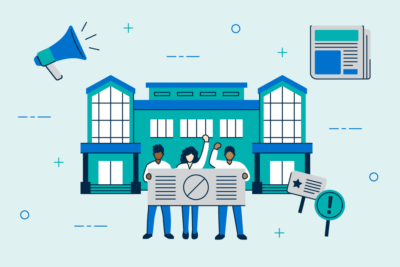Adapting Student Career Development for the Gen Z Era
Three critical investments to distinguish your institution from alternative options
Joe Infantino, Director, Research
This report is now free to access as part of EAB’s work to help education leaders and employers tackle student readiness challenges.
Across the coming decade, colleges and universities will be forced to confront growing challenges, such as intensified competition for students with ever-greater needs and expectations. University leaders must recognize that Gen Z students considering whether to enroll in higher ed are increasingly concerned about “life success,” which includes traditional measures like job security but also fulfillment and an overall sense of thriving.
All too often, higher ed leaders delegate student career development and outcomes entirely to the campus career center. Career centers alone, however, cannot meet these demands, especially with staffing shortages and limited financial resources. Student career development not only needs to be embedded across the college experience, but it also requires strategic direction and focused attention from cabinet leaders.
Read the main takeaways from the report below, or download the full PDF.
Status quo career services not producing desired outcome
Despite evolving student needs and rapidly changing workplaces, university career development has remained relatively the same across the last decade. As a result, alumni are increasingly underemployed and dissatisfied, often regretting their academic decisions due to colleges not meeting their career needs. As higher ed outcomes become less promising, prospective students and their families are more seriously weighing the cost of college against its perceived return on investment.
-
54%
of families reported ruling out universities based on cost before researching institutions
Ignoring student career development has mission-critical consequences
EAB research illustrates a trend that higher ed writ large has been hesitant to embrace: student career development is essential to student success and the college experience. The status quo approach, however, is no longer sufficient. Students want and need more than resume workshops, career counseling, career fairs, and mock interviews.
Because student career outcomes affect mission-critical priorities around enrollment, student success, mental health, and alumni engagement, cabinet leaders can’t afford to take a passive approach to these emerging concerns.
-
1/2
of young adult degree holders believe enrolling in university is the best investment for professional success
-
30%
of low-income or first-generation students secure a well-paying job or enter graduate school after degree completion
Three critical investments in student career development to make your institution stand out
1. Articulate a clear career payoff to prospective students
Craft a differentiated value proposition centered around life success and lead with outcomes and guarantees to demonstrate ROI to prospects.
2. Prepare students to thrive across the college-to-career journey
Provide support to students nearing known moments of career stress and cultivate inclusive workplace environments among employer partners.
3. Build social capital to level the playing field for underserved students
Increase exposure to employers for underserved students and deepen connections with young alumni professionals.
More Resources

Student Experience and Well-being Resource Center

Student Readiness Self-Audit
